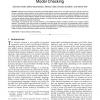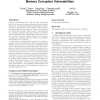92 search results - page 2 / 19 » Detecting Unknown Worms Using Randomness Check |
JCS
2006
13 years 4 months ago
2006
In recent years, the threats and damages caused by active worms have become more and more serious. In order to reduce the loss caused by fastspreading active worms, an effective de...
CN
2007
13 years 4 months ago
2007
Worms are self-replicating malicious programs that represent a major security threat for the Internet, as they can infect and damage a large number of vulnerable hosts at timescal...
ISI
2007
Springer
13 years 4 months ago
2007
Springer
—Detecting unknown malicious code (malcode) is a challenging task. Current common solutions, such as anti-virus tools, rely heavily on prior explicit knowledge of specific instan...
TDSC
2010
12 years 11 months ago
2010
Although recent estimates are speaking of 200,000 different viruses, worms, and Trojan horses, the majority of them are variants of previously existing malware. As these variants m...
CCS
2007
ACM
13 years 11 months ago
2007
ACM
Software vulnerabilities have been the main contributing factor to the Internet security problems such as fast spreading worms. Among these software vulnerabilities, memory corrup...


